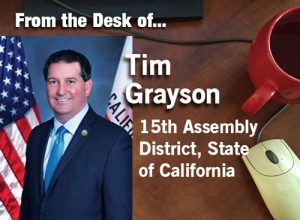Variety of factors make state budget process complicated
 (July 8, 2024) — Depending on whom you ask, California is either the 5th or 6th largest economy in the world, with a Gross Domestic Product of $3.86 trillion in 2023.
(July 8, 2024) — Depending on whom you ask, California is either the 5th or 6th largest economy in the world, with a Gross Domestic Product of $3.86 trillion in 2023.
To put that in perspective, the only economies larger than our state are the nations of the United States ($27 trillion), China ($17.7 trillion), Germany ($4.4 trillion) and Japan ($4.2 trillion). With that context, I’m sure it can be a bit of a headscratcher when you see news stories describing the challenges that legislators are facing to pass this year’s state budget.
Putting aside the natural political challenges that come with putting together any budget, there are a number of structural issues that exist in California that make the budgeting process even more challenging than normal.
California is one of 26 states with an initiative process that empowers its citizens to bypass the legislative process to directly amend the state Constitution as well as regular statutes. Our state’s initiative process is extremely deferential to the people, as we are one of the few states that prevents the Legislature from amending anything created by the initiative process unless there are provisions that explicitly allow for legislative amendments.
Important initiative
It is because of this process that approximately 40% of the state’s budget is spoken for before legislators act, due to the passage of Prop. 98 from 1998. That important and very necessary initiative added a minimum allocation of funds for K-14 education into the state Constitution.
Another structural challenge to California’s budgeting process is the extremely volatile nature of the state’s revenues. Because the majority of the state’s budget relies upon income taxes and capital gains taxes, our states fiscal fortunes tend to rise and fall with the success of the stock market (more specifically the issuance of new stock IPOs) and the overall economy.
This volatility can cause budget surpluses to become deficits in the blink of an eye, as we have seen in the last couple of budget cycles. Because we must pass a balanced budget, this sudden volatility can lead legislators to make difficult decisions.
Last year’s state budget totaled approximately $310 billion, which is nearly the size of the state budgets of Michigan, New Jersey, Maryland, Illinois and Georgia … combined. With a deficit that is estimated to be anywhere from $40 billion to $45 billion, there is much work to be done.
In spite of the uncertainty we face at the moment, I do remain hopeful. With the recent economic growth at the state and national level, I am cautiously optimistic that we will see surpluses much like the $97 billion we had just a couple of years ago.
I continue to be a big believer in California and its most powerful resource – we the people.
If you would like to learn more about the budget that was passed, or to connect with me on other matters that are important to you, please contact my Concord office at 925-521-1511.
